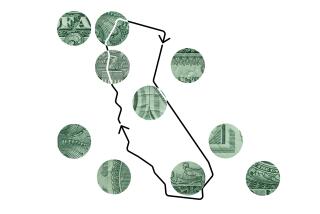Editorial: Charitable donations are a form of influence-peddling. And they should be stopped

It’s a truism about politics that money follows power.
And in California, those with money who want to influence those with lawmaking power have myriad legal ways of doing so. Individuals, companies and special interests looking to curry favor with elected officials can donate to reelection campaign accounts through political action committees, give gifts, pay for exotic travel, and wine and dine officials — all within limits set in law.
There are indirect ways to buy goodwill too, often without limits; one of the most troubling is through the use of “behested payments.” That’s when elected officials ask donors to give to a specific nonprofit or government program. The only legal requirement is that donations over $5,000 be reported to the state’s Fair Political Practices Commission.
These are just campaign donations cloaked in a facade of beneficence — and should be stopped, or at the very least heavily restricted.
Regrettably, that’s not likely to happen. Politicians are loath to give up their power to solicit charitable contributions from companies, wealthy individuals and other deep-pocketed donors. Behested payments support worthy causes and make politicians look generous and engaged without them having to spend a penny. Naturally, the nonprofits and service providers who receive the money like the system, too.
The system has resisted reforms, even modest ones, at the state and local level. In 2014 the California Legislature passed a bill prohibiting behested payments to nonprofits owned or controlled by the official or the family of the official soliciting the funds, which is hard to believe was allowed. In fact, it is allowed still because the bill was vetoed by then-Gov. Jerry Brown.
But let’s be clear what’s at work: Elected leaders use their power and position to ask for donations, often from people who have business interests in their jurisdiction. Those people make the donations knowing it will please the elected leader, who could help their business interests.
And it does appear to help in some cases. An L.A. Times analysis of behested payments to Gov. Gavin Newsom revealed that some of the companies that contributed a whopping $226 million to government causes on Newsom’s behalf last year received no-bid government contracts. Others had pending business before the governor or were seeking favorable appointments on important state boards. The governor’s office claims this was a case of the private sector eager to help the state respond to the COVID-19 pandemic, but it looks uncomfortably like pay to play nonetheless.
A few years ago, the Los Angeles Ethics Commission analyzed politician-induced charitable giving and found that more than half of behested payments reported by L.A. elected officials came from donors with business before City Hall. For that reason, and to reduce the appearance of pay to play, the commission recommended banning behested payments from individuals with business before the city. The City Council, however, rejected the reform.
Elected officials justify the donations as invaluable because the money goes to good works. But limiting behested payments wouldn’t prevent civic-minded companies from donating to nonprofits or supporting community events on their own initiative. For the sake of their own reputations, they would still have a responsibility to be good neighbors and corporate citizens. And even if behested payments were gone tomorrow, elected officials could still make broad public appeals via email or social media to help their favorite charity. What makes behested payments so insidious is the direct ask.
Worse, a growing number of contributors are able to give to politicians’ pet causes anonymously by routing behested payments through donor-advised funds. These funds are a type of charitable giving account offered by some nonprofit foundations and for-profit investment firms, and they allow the donor to collect income tax deductions and remain anonymous.
For example, after Newsom’s office reported a $1-million behested payment from the Silicon Valley Community Foundation, L.A. Times reporter Melody Gutierrez confirmed the money didn’t come from the foundation itself, but rather an individual’s or company’s account with the foundation. The name of the actual donor remains secret to the public, but presumably not to the governor who sought the donation.
This is a problem at the local level, too. L.A. Mayor Eric Garcetti has collected about $3.8 million from donor-advised funds for his charity, the Mayor’s Fund for Los Angeles. Although that’s a small share of the $60 million Garcetti has raised for the charity, the evasion of the transparency requirements is troubling. But even when fully disclosed, behested donations from interests seeking approvals or contracts from the city are corrosive.
It’s not surprising that donor-advised funds are the fastest-growing vehicles for charitable giving. Lawmakers ought to catch up and close the loopholes in state law that allow these donors to avoid disclosure. At the very least, they also should prohibit behested donations from companies and individuals actively seeking government contracts. Better yet, they should get rid of behested payments altogether and clear the taint of pay to play.
More to Read
A cure for the common opinion
Get thought-provoking perspectives with our weekly newsletter.
You may occasionally receive promotional content from the Los Angeles Times.






